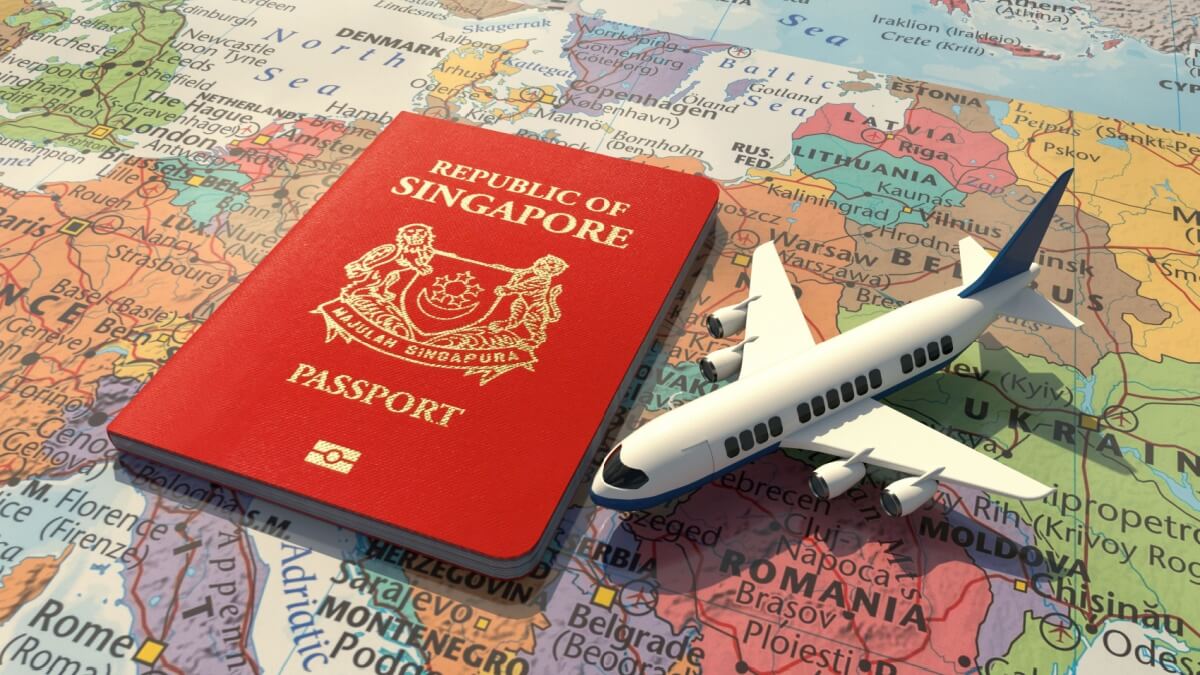Best international payroll providers in 2025
Learn about the top international payroll providers, their features, pricing, customer reviews and how to choose the right provider for your business.

Thinking of starting a business in Singapore, or perhaps expanding your UK business there?
The city state has lots to offer to foreign entrepreneurs, from its highly skilled workforce to its strategically strong location. It’s also known for advanced infrastructure and skilled workforce. However, you may also face challenges as a newcomer, especially when it comes to high operating costs and fierce local competition.
In this comprehensive guide, we’ll cover all the essentials you need to know about doing business in Singapore.
We’ll explore the benefits, opportunities and obstacles, along with business etiquette and corporate culture in Singapore. Plus, we’ll look at some of the most business-friendly parts of the state.
Research is key to success when expanding to Singapore, to understand local culture, business etiquette and regulatory requirements.
| Consideration | Description |
|---|---|
| Opportunities/benefits |
|
| Challenges |
|
| Most attractive regions for foreign entrepreneurs |
|
There are lots of reasons why UK businesses choose to expand their operations to Singapore. We’ll explore the most obvious benefits of starting a business in Singapore below.
One of the biggest attractions of Singapore for businesses of all sizes is its location. The city state is in the heart of Southeast Asia, and can act as a gateway to China, India and other ASEAN markets. This could mean a potential market of around 677 million new customers¹, as well as the opportunity to trade and source supplies from other countries.
Singapore is also recognised as a global business hub, with world-leading infrastructure. It’s well connected too, with efficient global trade routes and access to 330+ cities worldwide via Singapore Changi Airport.² This also means short flight times to other major business hubs such as Jakarta and Bangkok.
Singapore has competitive corporate tax rates, at a flat rate of 17% for most companies - this is one of the lowest in Asia.² However, there’s also an extra tax break for startups and small businesses, with exemptions on up to 200,000 SGD of income.²
Plus, some foreign income is tax-free (under certain conditions), and there are also exemptions on Goods and Services Tax (GST) for exports and international services.²
Singapore has a hugely supportive startup ecosystem, with a number of incubator and accelerator programs, government-backed schemes and funding pathways available for entrepreneurs. This includes:
The city state is also a hotspot for venture capital, with total venture capital (VC) funding expected to reach $10.32 billion USD in 2025.³
So if you need capital to start or grow your business, Singapore could be the ideal place to find it.
Singapore is regularly named the best in the world for skilled workers,⁴ so it could be the perfect place to find the talent you need to drive your business forward.
Across the population, there’s an incredibly high literacy rate of 97.6%² and many people are multi-lingual. The city state also boasts globally recognised talent across sectors such as tech, finance and advanced manufacturing, partly driven by government talent initiatives such as SkillsFuture and the Skills Development Fund (SDF).
As you may expect from such a technologically advanced and innovative country like Singapore, some of the best opportunities for startups and scaleups are in tech-driven industries. The city state is particularly known for innovation in ecommerce, digital services and fintech in general, and the country is also actively promoting deep tech startups.
While local competition may be fierce (which we’ll look at shortly), there are extensive networks and support systems in place for tech-based startups to launch, grow and innovate in Singapore.
| 💡 Read our international expansion checklist |
|---|
While Singapore may present many exciting opportunities for UK entrepreneurs and growing startups, it also has its challenges. It’s good to be aware of these from the outset, so you know what to expect and can prepare accordingly.
Here, we’ll take a look at a few of the most common challenges UK startups face when launching in Singapore.
Singapore may be an extremely attractive place to launch or expand a business, but its popularity can also make it challenging to find a foothold.
It’s a highly competitive business environment, a relatively small city state almost full to bursting with both large, established corporations and up-and-coming startups - and everything in between.
If you’re moving there to seize opportunities in a sector like tech, you’re likely to find it extremely crowded. It can be difficult to find your niche and establish your new business, especially when your rivals have more knowledge of the ASEAN market and the trust of local customers.
You’ll need to have deep pockets to start and run a business in Singapore, as costs can be much higher there than the UK. In fact, the cost of living is nearly 60% higher than in the UK, once rent is taken into account.⁵
This can mean that day-to-day company expenses can be much higher, from office rental to utility costs. Paying your employees may also be more expensive, as the average net salary after tax in Singapore is nearly $800 higher than in London.⁶
Singapore may open up access to the wider ASEAN region, but its own domestic market is pretty small at just 6 million people.²
This limited customer base could put a cap on your revenue potential and growth, as well as intensifying the competition within your niche. It may even be the case that complete market saturation has already occurred within your sector, so there’s no room for newcomers.
| 💡 Learn more about navigating risks of international expansion |
|---|
The process of setting up an entity in Singapore generally involves the following steps:
You may want to work with an international business consultant and/or a global company formation provider.
A specialist with knowledge of Singapore can help you navigate the process and understand the specific requirements for establishing a business there.
| 💡 Read our full guide to setting up a business in Singapore 🇸🇬 |
|---|
The part of Singapore you choose to start your business in will largely depend on your market research, as you’ll want to go where there are the most opportunities and demand for your product or service.
But generally speaking, some cities and areas in Singapore are more attractive for UK-owned startups than others. Let’s take a look.

The most obvious place for a new business to set up shop in Singapore is the Central Business District (CBD). This includes areas like Raffles Place, Collyer Quay, Clifford Pier, Cecil Street and Shenton Way.
This is the financial hub of Singapore, and home to a high concentration of global, established and smaller businesses. It’s the ideal location for making connections and networking, as well as accessing the city’s best facilities, co-working spaces and business infrastructure. However, being in the heart of it all does come with a higher price compared to other parts of the city.

The JID is a specially designed hub which aims to foster innovation and help startups grow, with a particular focus on advanced manufacturing, cleantech and urban solutions. It spans a huge 600 hectares and is home to leading research institution Nanyang Technological University (NTU) and the eco-business hub and R&D centre known as CleanTech Park.
Businesses based there benefit from cutting-edge infrastructure and a supportive, innovative environment, as well as access to talented workers and a thriving knowledge base.
If you’re a startup with an eye on Singapore, you may already know about Blk71. It’s a tech startup hub by NUS Enterprise, with locations in Jakarta, San Francisco and Suzhou in China. In Singapore, the incubator is located in a factory building on the Ayer Rajah Industrial Estate of one-north.
Blk71 aims to help startups level up quickly, with the support of a strong network, tools and funding. It’s highly competitive though, so you’ll need a great application to stand a chance of acceptance.
One of the hardest things to adjust to as a UK entrepreneur expanding to a foreign market is the difference in culture - both inside and outside of the business world.
Language can also be an issue, but luckily you’ll find that English is widely spoken in the Singaporean business world.
Singapore is a fascinating place due to its vibrant mix of cultures, so there’s no one set of etiquette ‘rules’ or cultural norms there. Instead, you’ll need to take the time to research and adjust to the many nuances of doing business with people from around the world.
Across most cultures though, punctuality and respect are highly valued. With this in mind, you’ll also want to make an extra effort to master naming conventions in Singapore - to avoid the risk of offending your new clients and colleagues.
| 💡 You may also like our guides to doing business in Asia✈️ |
|---|
While having a corporate bank account may be an essential for starting a company overseas, you can also use Wise Business to help grow your business in Singapore.
Open a Wise Business account and you can manage your company’s finances in 40+ currencies all in one place, including SGD, GBP, EUR, USD and all other major currencies. You’ll be able to pay suppliers and staff in their own currency, as well as receiving payments in multiple currencies.
Wise payments are fast and secure (even for large amounts). Best of all, you’ll only pay low, transparent fees and always get the mid-market exchange rate.
With Wise Business, you’ll also benefit from the following features:
It’s quick and easy to open a Wise Business account in Singapore, with a fully digital application, verification and on-boarding process. Check out the requirements here.
Wise works almost everywhere, and you can also open an account in other Asia-Pacific countries such as Australia, New Zealand, Malaysia, India, Indonesia and Japan.
Sources used:
Sources last checked on date: 11-Aug-2025
*Please see terms of use and product availability for your region or visit Wise fees and pricing for the most up to date pricing and fee information.
This publication is provided for general information purposes and does not constitute legal, tax or other professional advice from Wise Payments Limited or its subsidiaries and its affiliates, and it is not intended as a substitute for obtaining advice from a financial advisor or any other professional.
We make no representations, warranties or guarantees, whether expressed or implied, that the content in the publication is accurate, complete or up to date.

Learn about the top international payroll providers, their features, pricing, customer reviews and how to choose the right provider for your business.

Here’s an objective review of the best corporate tax software for International Businesses. Learn about their features, prices and ratings.

There are several reasons why international investment is appealing to UK startups at the moment. With economic uncertainty prevailing, the impact of Brexit...

Digital Product Passports are reshaping EU trade. Discover what’s required and how Wise Business makes compliance more cost-effective.

Learn how to start a business in Mexico, focusing on opportunities and regulations to navigate for successful operations.

Discover the 10 best European cities to start or grow your business in 2025 with funding, talent, and speed you won’t find in the UK.